Athletics at the 1912 Summer Olympics – Men's decathlon
The men's decathlon was a track and field athletics event held as part of the athletics at the 1912 Summer Olympics programme. The competition was held from Saturday, July 13, 1912, to Monday, July 15, 1912. It was the first time the decathlon, which had been introduced in 1911, was held at the Olympics; a different ten-event competition, the all-around, had been contested in St. Louis in 1904. Twenty-nine decathletes from twelve nations competed.[1] NOCs could enter up to 12 athletes.[2]
| Men's decathlon at the Games of the V Olympiad | |||||||||||||||||
|---|---|---|---|---|---|---|---|---|---|---|---|---|---|---|---|---|---|
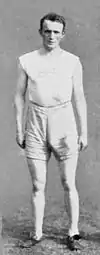 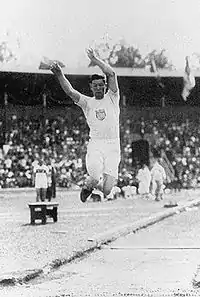 Gold medalists Hugo Wieslander and Jim Thorpe | |||||||||||||||||
| Venue | Stockholm Olympic Stadium | ||||||||||||||||
| Dates | July 13–15 | ||||||||||||||||
| Competitors | 29 from 12 nations | ||||||||||||||||
| Medalists | |||||||||||||||||
| |||||||||||||||||
| Athletics at the 1912 Summer Olympics | |
|---|---|
| Track events | |
| 100 m | men |
| 200 m | men |
| 400 m | men |
| 800 m | men |
| 1500 m | men |
| 5000 m | men |
| 10,000 m | men |
| 110 m hurdles | men |
| 4×100 m relay | men |
| 4×400 m relay | men |
| 3000 m team race | men |
| 10 km walk | men |
| Road events | |
| Marathon | men |
| Field events | |
| Long jump | men |
| Triple jump | men |
| High jump | men |
| Pole vault | men |
| Standing long jump | men |
| Standing high jump | men |
| Shot put | men |
| Discus throw | men |
| Hammer throw | men |
| Javelin throw | men |
| 2-hand shot put | men |
| 2-hand discus | men |
| 2-hand javelin | men |
| Combined events | |
| Pentathlon | men |
| Decathlon | men |
| Cross-country events | |
| Individual | men |
| Team | men |
Results
Thorpe's gold medal was stripped by the International Olympic Committee in 1913, after the IOC learned that Thorpe had taken expense money for playing baseball, violating Olympic amateurism rules, before the 1912 Games. This moved everyone else up in the rankings. In 1982, the IOC was convinced that the disqualification had been improper, as no protest against Thorpe's eligibility had been brought within the required 30 days, and reinstated Thorpe's medals. This made Thorpe and Wieslander co-champions.
Avery Brundage, president of the IOC from 1952 to 1972, competed in the decathlon finishing in 16th place. Brundage did not start in the last two events of the competition.
100 metres
| Event 1 | |||
|---|---|---|---|
| Place | Athlete | Time | Score |
| 1 | 11.0 | 952.4 | |
| 11.0 | 952.4 | ||
| 3 | 11.2 | 904.8 | |
| 11.2 | 904.8 | ||
| 5 | 11.3 | 881.0 | |
| 11.3 | 881.0 | ||
| 7 | 11.4 | 857.2 | |
| 8 | 11.5 | 833.4 | |
| 11.5 | 833.4 | ||
| 10 | 11.6 | 809.6 | |
| 11.6 | 809.6 | ||
| 12 | 11.7 | 785.8 | |
| 13 | 11.8 | 762.0 | |
| 11.8 | 762.0 | ||
| 11.8 | 762.0 | ||
| 16 | 12.0 | 714.4 | |
| 12.0 | 714.4 | ||
| 18 | 12.1 | 690.6 | |
| 12.1 | 690.6 | ||
| 20 | 12.2 | 666.8 | |
| 12.2 | 666.8 | ||
| 22 | 12.3 | 643.0 | |
| 12.3 | 643.0 | ||
| 12.3 | 643.0 | ||
| 12.3 | 643.0 | ||
| 26 | 12.4 | 619.2 | |
| 12.4 | 619.2 | ||
| 28 | 12.5 | 595.4 | |
| 29 | 13.3 | 405.0 | |
Long jump
|
| ||||||||||||||||||||||||||||||||||||||||||||||||||||||||||||||||||||||||||||||||||||||||||||||||||||||||||||||||||||||||||||||||||||||||||||||||||||||||||||||||||||||||||||||||||||||||||||||||||||||||||||||||||||||||||||||||||||||||||||||||||||||||||||||||||||||||||||||||||||||
Shot put
|
| ||||||||||||||||||||||||||||||||||||||||||||||||||||||||||||||||||||||||||||||||||||||||||||||||||||||||||||||||||||||||||||||||||||||||||||||||||||||||||||||||||||||||||||||||||||||||||||||||||||||||||||||||||||||||||||||||||||||||||||||||||||||||||||||||||||||||||||||||||||||||||||||||||||||||||||||||||||
High jump
6 of the 29 starters did not appear for the fourth event.
|
| |||||||||||||||||||||||||||||||||||||||||||||||||||||||||||||||||||||||||||||||||||||||||||||||||||||||||||||||||||||||||||||||||||||||||||||||||||||||||||||||||||||||||||||||||||||||||||||||||||||||||||||||||||||||||||||||||||||||||||||||||||||||||||||||||||||||||||||||||||||||||||||||||||||||||||||||||||||||||||||||||
400 metres
5 more athletes, including the 6th-placed Nilsson, retired after the high jump and did not appear for the fifth event. This brought the number of non-finishers up to 11, leaving 18 to continue the competition.
|
| |||||||||||||||||||||||||||||||||||||||||||||||||||||||||||||||||||||||||||||||||||||||||||||||||||||||||||||||||||||||||||||||||||||||||||||||||||||||||||||||||||||||||||||||||||||||||||||||||||||||||||||||||||||||||||||||||||||||||||||||||||||||||||||||||||||||||||||||||||||||||||||||||||||||||||||||||||||||||||||||||||||||||||||||||||||||||||||||||||||||||
Discus throw
Philbrook scored over 1000 points in the event by breaking the previous Olympic record (listed as 41.46 metres in the 1912 official report, though actually only 40.89 set by Martin Sheridan in 1908). Since the discus throw event had been held 2 days prior to the decathlon and Armas Taipale had far exceeded the old record, Philbrook's mark was not a new record. It did vault him from 5th place to 2nd following the 6th event, however.
|
| |||||||||||||||||||||||||||||||||||||||||||||||||||||||||||||||||||||||||||||||||||||||||||||||||||||||||||||||||||||||||||||||||||||||||||||||||||||||||||||||||||||||||||||||||||||||||||||||||||||||||||||||||||||||||||||||||||||||||||||||||||||||||||||||||||||||||||||||||||||||||||||||||||||||||||||||||||||||||||||||||||||||||||||||||||||||||||||||||||||||||||||||||||||||||||||||||||||||||
110 metre hurdles
|
| |||||||||||||||||||||||||||||||||||||||||||||||||||||||||||||||||||||||||||||||||||||||||||||||||||||||||||||||||||||||||||||||||||||||||||||||||||||||||||||||||||||||||||||||||||||||||||||||||||||||||||||||||||||||||||||||||||||||||||||||||||||||||||||||||||||||||||||||||||||||||||||||||||||||||||||||||||||||||||||||||||||||||||||||||||||||||||||||||||||||||||||||||||||||||||||||||||||||||||||||||||||||||||||||||||
Pole vault
Two more athletes dropped out, leaving 16 left out of the original 29.
|
| |||||||||||||||||||||||||||||||||||||||||||||||||||||||||||||||||||||||||||||||||||||||||||||||||||||||||||||||||||||||||||||||||||||||||||||||||||||||||||||||||||||||||||||||||||||||||||||||||||||||||||||||||||||||||||||||||||||||||||||||||||||||||||||||||||||||||||||||||||||||||||||||||||||||||||||||||||||||||||||||||||||||||||||||||||||||||||||||||||||||||||||||||||||||||||||||||||||||||||||||||||||||||||||||||||||||||||||||||||||||||||||||
Javelin throw
Only 14 athletes, fewer than half of the original 29, began the penultimate event.
|
| ||||||||||||||||||||||||||||||||||||||||||||||||||||||||||||||||||||||||||||||||||||||||||||||||||||||||||||||||||||||||||||||||||||||||||||||||||||||||||||||||||||||||||||||||||||||||||||||||||||||||||||||||||||||||||||||||||||||||||||||||||||||||||||||||||||||||||||||||||||||||||||||||||||||||||||||||||||||||||||||||||||||||||||||||||||||||||||||||||||||||||||||||||||||||||||||||||||||||||||||||||||||||||||||||||||||||||||||||||||||||||||||||||||||||||||||||||||||||||||||||||
1500 metres
Only 12 of the 29 starters finished the entire decathlon event. Thorpe's disqualification in 1913 and subsequent reinstatement 70 years later resulted in the top 4 finishers being awarded medals—2 gold, a silver, and a bronze. |
| |||||||||||||||||||||||||||||||||||||||||||||||||||||||||||||||||||||||||||||||||||||||||||||||||||||||||||||||||||||||||||||||||||||||||||||||||||||||||||||||||||||||||||||||||||||||||||||||||||||||||||||||||||||||||||||||||||||||||||||||||||||||||||||||||||||||||||||||||||||||||||||||||||||||||||||||||||||||||||||||||||||||||||||||||||||||||||||||||||||||||||||||||||||||||||||||||||||||||||||||||||||||||||||||||||||||||||||||||||||||||||||||||||||||||||||||||||||||||||||||||||||||||||||||||||||||||||||||
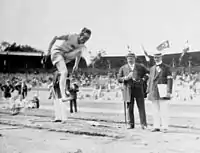 Hugo Wieslander in long jump. |
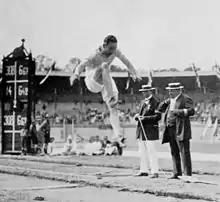 Eugene Mercer in long jump. |
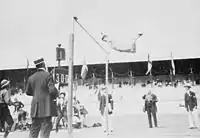 Hugo Wieslander in pole vault. |
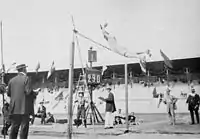 Jim Thorpe in pole vault. |
Notes
- "Athletics at the 1912 Stockholm Summer Games: Men's Decathlon". sports-reference.com. Archived from the original on 17 April 2020. Retrieved 24 January 2018.
- Official report, p. 61.
- This score is reported in the Official Report. According to the formula given earlier in the Report (1000 point base, plus .38 points for each .01 metres from 41.46), however, the score should have been 1003.80 points.
- Score as reported in the OR. The formula gives 719.18 points.
- Score as reported in the OR. The formula gives 388.58 points.
- Total as given in Wudarski. A sum of the scores given by formula gives a total of 8412.995 points.
References
- Bergvall, Erik (ed.) (1913). Adams-Ray, Edward (trans.). (ed.). The Official Report of the Olympic Games of Stockholm 1912. Stockholm: Wahlström & Widstrand.CS1 maint: extra text: authors list (link)
- Wudarski, Pawel (1999). "Wyniki Igrzysk Olimpijskich" (in Polish). Retrieved 7 January 2007.